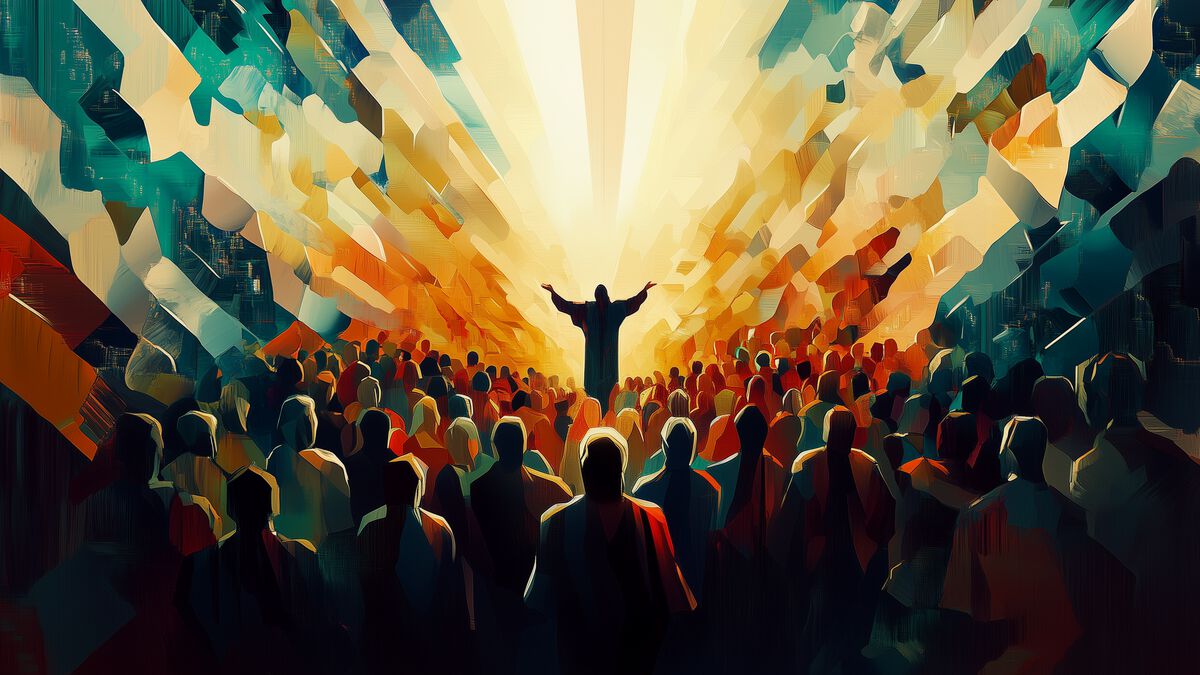Miracle Optimization
Lincoln Cannon
14 September 2024 (updated 3 January 2026)
After reading my recent article on “The Technological Conception,” a friend suggested to me that I might be leaving some value on the table, so to speak. His concern was, essentially, that my preference for simplicity might have led me to an insufficient explanation for real possibilities with greater overall practical value. In other words, God might occasionally have solid practical reason for miraculous conception rather than simple conception – still natural, but perhaps more technological than biological.
My friend was right. There’s more to say about miracles, especially from a practical perspective. So let’s explore.
What is a miracle? Some consider miracles to be interruptions of natural law by divine intervention – antinaturalism. But the Mormon Transhumanist perspective is steadfastly naturalist, richer and more nuanced, situating miracles as part of an expansive view of natural law and human potential.
From this perspective, why might God perform or enable miracles? How and why might God optimize the frequency and magnitude of miracles? And how should we, in turn, optimize our perspectives on miracles?
Defining Miracles
Miracles can be literal – real physical events that defy our present ability to understand scientifically or replicate technologically. But they can also be figurative, representing spiritual or psychological transformation. Literal miracles might include actually healing the sick or really walking on water. Figurative miracles might include calming a storm as a metaphor for finding peace amidst suffering, or raising the dead as a metaphor for experiencing hope in times of despair.
While it may be tempting to marginalize the value of figurative miracles, they have substantial power. For example, someone may find unexpected strength to forgive an enemy after contemplating the scriptural story of Jesus healing a man who was sent to arrest him. Such change provides psychological benefits, as well as social benefits when repeated at scale – many people experiencing similar change while contemplating the story. The capacity for forgiveness can mend relationships and create a ripple effect, promoting greater social cohesion.
On the other hand, although it may be hard for some of us, we can esteem literal miracles as real natural events. Some secular persons have exemplified this. Notable among them is science fiction author Arthur C. Clarke, who observed, “Any sufficiently advanced technology is indistinguishable from magic.” Just substitute “miracle” for “magic.”
Mormon authorities have also exemplified the naturalistic approach to literal miracles. James Talmage claimed, “Miracles cannot be in contravention of natural law, but are wrought through the operation of laws not universally or commonly recognized.” Speaking of modern medicine, travel, and communications, Gordon B. Hinckley observed, “It is a miracle. The fruits of science have been manifest everywhere.”
What about the historical Jesus of Nazareth? In the New Testament, even Jesus hints at what we might reasonably interpret as encouragement toward a mechanistic, and thereby naturalistic, approach to literal miracles. On one occasion, he applies mud and prescribes washing to heal blindness. And on another occasion, he comments regarding a particularly persistent demonic possession, “This kind can come out only by prayer.”
Practical Consequences of Miracles
What’s the point? When we hear about miracles, or experience what we esteem to be miraculous, why do we care? Why do scriptural stories about miracles attract so much attention, both fascination and derision? Are there potential detriments in addition to benefits?
Of course, those who experience a miracle label the experience as “miracle” because we esteem the experience to be good, at least on the whole. We generally don’t use “miracle” to describe bad experience. We associate a greater purpose or perhaps superintelligent intention with an experience that is otherwise more difficult or less satisfying for us to explain, thereby reinforcing the experience with something of an enduring psychological boost. A potential downside to this is that it can cultivate an explanatory laziness, leading to antinaturalism.
The scriptures use miracles, at least in part, to illustrate divine intervention and signify the presence of God in the world. Miracles communicate God’s concern and love for creation, moving theology away from a passive deism. Divine acts can motivate believers to follow the example of God, engaging actively in the world. But, as with direct experience of miracles, stories about miracles can lead some toward a passive antinaturalism that expects God to do everything and pacifies us against real action.
Optimal Frequency and Magnitude
Given the possibility space of practical consequence for us, miracles would also have practical consequence for God – for any superintelligence that may care about the future of humanity. Assuming God does perform or enable miracles, balancing their frequency and magnitude becomes vital.
Occurring too often or commonly, miracles would erode agency, reducing opportunities and incentives for personal and communal growth. They would cultivate dependence on the source of superhuman power, reducing or eliminating any necessity for human courage, compassion, or creativity, thereby undermining our potential. Conversely, a total absence of miracles, too few, or even a lack of stories about miracles, might impoverish our world as grounds for cultivating those same virtues of courage, compassion, and creativity. A context that inhibits belief in or even imagination of the miraculous could exacerbate tendencies toward apathy or hopelessness.
The same goes for their obviousness and magnitude. Miracles too obvious could foster dependency. Miracles too extraordinary could overwhelm our capacity for understanding, breaking down our sense of experiential coherence, thereby marginalizing or altogether destroying our capacity to operate effectively in the world – there would be no lawyers or physicists. Miracles too subtle might be overlooked, or altogether fail to qualify for the “miracle” label.
If God exists, God is surely attempting miracle optimization to whatever extent is feasible. And our world of experience and observation surely reflects God’s attempts. The practical consequences are surely too significant to ignore, at least for any superintelligence worthy of the title “God.”
Of course, maybe such trust is incorrect. Maybe God doesn’t exist and literal miracles are solely the province of strange physics in cosmic anomalies and ever-advancing human technologies. But, as the New God Argument points out, we have practical reason, even existential reason, to trust in a superintelligent natural God. By extension, we have practical reason to trust in miracle optimization.
From a Christian perspective, such optimization can be esteemed as an extension of the Atonement – understood practically as reconciliation within God, with and among humanity, on both ethical and epistemic levels. Superintelligence could surely deepfake us into oblivion, as human-created AI is already beginning to suggest. And yet the grace of God establishes and maintains a world, an experiential context, within which we have both stable opportunity and substantial inspiration for progress toward becoming like God ourselves. As my friend pointed out to me, miracle optimization is the scriptural covenant between God and humanity, once symbolized by an ancient writer’s revelation on the rainbow – even a secular physicist can appreciate both the stability and wonder of natural law promised by such phenomena.
Our Perspective on Miracles
Through the lens of Mormon Transhumanism, we can more clearly see the practical breadth and depth of miracles. Whether figurative or literal, they transform us. Properly optimized in frequency and magnitude, they can maintain the opportunities of genuine agency while inspiring us with assured possibility. This view of miracle optimization is a covenant between God and humanity, aimed at cultivating our Godhood.
That’s my perspective. To some extent, I choose it voluntarily, recognizing that I could choose to cultivate and ultimately embrace competing perspectives – either more antinaturalist or more skeptical. And I invite you to choose the same, to begin or continue cultivating such a perspective on miracle optimization, for practical reasons. You will find as I have, if you haven’t already, that this perspective fills the ambiguity of experience with persistent practical assurance of hope for a much better world – a miracle.



